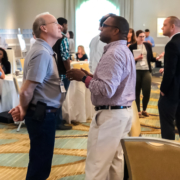Diversity + Mentoring = Increased Inclusion in the Workplace
I’ve been reflecting a lot on the Venn diagram between Diversity and Inclusion (D & I) and what we like to call Mentoring 2.0 (Mentoring + Sponsorship). For some reason, they seem to be siloed “movements.”
A sponsor is a leader championing another executive behind closed doors for career advancement and opportunity. A mentor shares his/her skills, knowledge, and experience with another in a mutual collaboration or partnership.
“Should mentoring fall under HR or Diversity?” executives ask me often. That’s one of the big issues. Who in a corporation “owns'” the work to build a mentoring initiative or culture?
“Mentoring is a four-letter word around here,” said another executive. “We had a failed initiative a few years ago and …”
The more I work with leaders on the challenges they are solving for, the more I see they are interdependent movements that need to join each other at the strategy table from now on. Employee engagement, Millennial retention, advancement of women and minorities, workplace isolation with a 32% engagement rate (Gallup), the more I see inclusion is actually the heart of the Venn handshake between mentoring and diversity (see image above).
Let’s look at some of the data out there:
According to the Association for Talent Development, 44% of CEOs list mentorship programs as one of the three most valuable strategies to advance women into Senior Management. At Goldman Sachs, 70% of women who were mentored by senior leaders (1 leader mentoring 5 women) were promoted to Managing Director roles within five years.
Additionally, a relatively new study by Kaitlyn Conboy and Chris Kelly at Cornell University illustrate some powerful findings:
Mentoring is more effective than other diversity initiatives. “Large companies implement a variety of diversity initiatives, including voluntary training, targeted recruitment, cross-training as well as mentorship. Mentorship programs can boost the representation of Black, Hispanic, and Asian American women, and Hispanic and Asian-American men at manager levels by 9% to 24%, as compared to the other initiatives which have lower results ranging from -2% to 18%,” the study states.
It is reminiscent of my conversations a few years ago with Harvard professor Frank Dobbins who researched 800 major companies over 30 years :
“In analyzing three decades’ worth of data from more than 800 U.S. firms and interviewing hundreds of line managers and executives at length, we’ve seen that companies get better results when they ease up on the control tactics. It’s more effective to engage managers in solving the problem, increase their on-the-job contact with female and minority workers, and promote social accountability—the desire to look fair-minded. That’s why interventions such as targeted college recruitment, mentoring programs, self-managed teams, and task forces have boosted diversity in businesses. Some of the most effective solutions aren’t even designed with diversity in mind,” states Dobbins.
The Cornell study also found that “Mentoring improves both the promotion and retention of diverse groups. In fact, they help increase promotion and retention rates of minority men and women by 15%-38% compared to non-mentored minorities. It has been inferred that this is due to innate biases that influence people to help those who are similar to themselves; therefore, the lower number of minorities in upper management means that those who do not have a mentor, either organic or assigned, will not benefit due to a lack of access.”
—
Part of that access is that mentees often choose mentors in their own likeness and mentors often choose mentees in their own likeness. Golf course- manicure buddies! So where and how does our workforce get that access that will drive more diverse mentoring and yield more inclusion?
“Ladies and gentlemen, we want you to find someone who does not remind you of yourself,” I said at a conference from the podium midway during one of our Mentor Road Trip™ Flash Mentoring sessions.
Leaders and executives look at me with mild surprise and then go about the task of finding someone who they believe is different then themselves.
“You can go beyond race, religion, and gender,” just find someone who for whatever reason does not remind you of yourself, I restate.
They do and big smiles come out. The interaction desire is strong.
Earlier I asked ” How many of you have a mentor, someone you can go to for professional advice?” Less than 30% raise their hands (every time and less than 15% share they are mentoring others).
“Whoever traveled the furthest to be here at the conference (or training session), you will take on the role of the mentor this segment”
“Mentors share your first three months on the job at the company [be it Verizon Wireless, Marriott, NextEra, University of XYZ etc.]. What is the best mentoring advice anyone gave you there?” I ask. “Mentees, this is for your learning so don’t hesitate to ask questions. You have 6-minutes team, GO.”
Before people leave the session, they set up a coffee date with someone that they choose to continue a mentoring conversation with. The next month, its time to formalize these or new pairings with official mentor training 1.0 and a six to nine-month gameplan.
It is a simple exercise but boy does it break down the barriers or the ‘elevator pause’ we see out there! That feeling you have when you are on an elevator of strangers. Does anyone say hi? Do we break the ice and human meets human, or do we pause, look down at our Samsungs and iPhones, step off on floor six and go about our days?
When we mentor more diversely we get more diversity in our companies. When mentoring meets diversity hand in hand we get more inclusion. When our younger generation mentors our older generations (reverse mentoring) we get more engagement and inclusion.
When we engineer mentoring in a fun, user-friendly way we get more mentor-mentee and diverse mentor matches. Human sees human. Phone goes into the jacket pocket. Human helps human.
We are happy to share our new Mentoring Imperative E-Book with you to look at the compelling data and start a new dialogue internally.
You will learn how mentoring is a vehicle to drive:
Diversity, multigenerational employee retention, engagement, knowledge transfer, and build leadership legacies.
YOUR COPY: Just email info@twomentor.com with your name, company, and best contact information.
HERE TO HELP YOU BUILD THE RIGHT WAY: Let’s discuss your unique needs and our outsourced mentoring offerings, training, conference keynotes, flash mentoring sessions and more. Contact, Sophia@twomentor.com or 18006071605.









